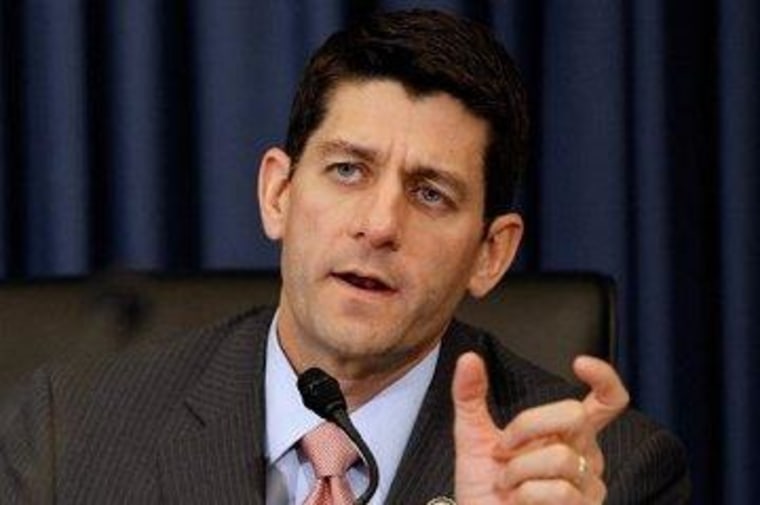The Republican message during the 2012 elections was fairly specific: this one was for all the marbles. Americans were witnessing -- and participating in -- a once-in-a-generation showdown that would, once and for all, dictate the direction of the country in the near future. It was, we were told, the most spectacularly important, history-changing, life-setting election any of us have ever seen. Some insisted 2012 would be the most critical election cycle for the United States since 1860 -- the election before the Civil War.
And then the results came in. President Obama won with relative ease; Senate Democrats expanded their majority; House Democrats gained seats; and Republicans said, "On second thought...."
House Budget Committee Chairman Paul Ryan (R-Wis.), who was on his party's national ticket and whose plan was enveloped into his party's platform, will unveil the House Republican budget plan today, outlining the GOP's vision for the near future on taxes, spending, deficit reduction, and social-insurance programs. In this one document, we learn quite a bit about the specific scope of Republican priorities.
And while the plan itself won't be publicly available until later this morning, Ryan has another Wall Street Journal op-ed pitching his plan. I'll have more detailed coverage once the budget is released, but there are five broader takeaways to keep in mind as the debate begins in earnest.
1. Ryan's budget is far-right plan with magic asterisks: Instead of paying any attention to the results of the 2012 elections, Ryan is right back where he was before -- pitching a far-right plan predicated on scrapping Medicare, slashing public investments, and giving the wealthy massive tax cuts. That's not what the American mainstream wants? Ryan doesn't give a damn. As has been the case, he pays for the tax cuts with smoke and mirrors, promising new revenue from "reforms" that only he can see.
2. Ryan's budget is breathtakingly hypocritical : For all the GOP rhetoric about how President Obama isn't "serious" about fiscal responsibility, Ryan relies heavily on the same Obama policies Republicans claim to hate. Specifically, the new House Republican budget takes full advantage of Obama's tax hikes on the wealthy and savings from the Affordable Care Act -- the same policies Ryan and his cohorts claim to hate.
3. Ryan's budget prioritizes balanced budgets for no apparent reason: The point behind the new GOP plan is to balance the budget within 10 years. Why? No one has any idea, and most credible economists believe such efforts might even do severe damage to the economy. Ryan's op-ed said his rushed efforts to eliminate the deficit that Republicans built up during the Bush/Cheney era will help thanks to low interest rates -- but as Ryan should know, interest rates are already extremely low.
4. Ryan's budget is needlessly confrontational : There's simply no way Senate Democrats would ever endorse such a far-right budget plan, so there's no real point to Ryan's vanity exercise. It will put House Republicans on record in support of a fairly radical vision -- which the American mainstream will find outrageous -- but to no practical end.
5. Ryan's budget makes Democrats very happy: With Democrats hoping for significant gains in the 2014 midterms, they'll need a potent weapon to use against Republican incumbents. Had Ryan moderated his budget plan and left Medicare alone, Democrats would need to look elsewhere for rhetorical ammunition. Instead, the Wisconsin congressman has done the DCCC a big favor.
Indeed, the only folks happier than the GOP base today are the Democrats planning the party's 2014 strategy.
